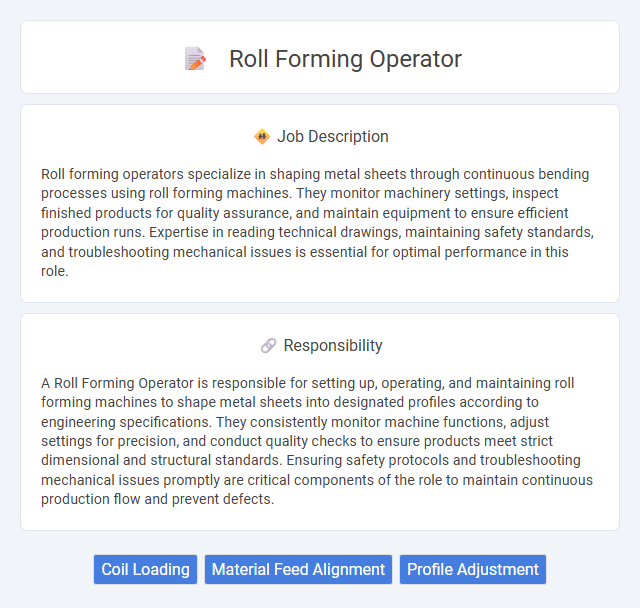
Roll forming operators specialize in shaping metal sheets through continuous bending processes using roll forming machines. They monitor machinery settings, inspect finished products for quality assurance, and maintain equipment to ensure efficient production runs. Expertise in reading technical drawings, maintaining safety standards, and troubleshooting mechanical issues is essential for optimal performance in this role.
Individuals with good physical stamina and attention to detail are likely suitable for roll forming operator roles. Those comfortable with repetitive tasks and working in industrial environments may find this job aligns well with their skills. People prone to fatigue or requiring frequent breaks might face challenges maintaining the job's demands.
Qualification
Roll forming operators require a high school diploma or equivalent, with vocational training in metal fabrication or machinery operation preferred. Strong mechanical aptitude, knowledge of roll forming machinery, and the ability to read technical blueprints are essential for precision and safety. Experience in industrial settings, attention to detail, and adherence to safety regulations significantly enhance job performance in this role.
Responsibility
A Roll Forming Operator is responsible for setting up, operating, and maintaining roll forming machines to shape metal sheets into designated profiles according to engineering specifications. They consistently monitor machine functions, adjust settings for precision, and conduct quality checks to ensure products meet strict dimensional and structural standards. Ensuring safety protocols and troubleshooting mechanical issues promptly are critical components of the role to maintain continuous production flow and prevent defects.
Benefit
Roll forming operator jobs likely offer competitive wages and steady employment due to the specialized skills required in shaping metal materials for construction and manufacturing industries. Workers may benefit from opportunities for career advancement through skill development and on-the-job training programs. Employers often provide safety training and health benefits, contributing to a secure and supportive work environment.
Challenge
The role of a roll forming operator likely presents challenges related to maintaining precision while managing complex machinery under tight production schedules. Operators probably face difficulties in troubleshooting mechanical issues quickly to minimize downtime and ensure consistent product quality. The position may also require continuous adaptation to new technologies and process improvements to meet evolving manufacturing standards.
Career Advancement
Roll forming operator roles provide hands-on experience in metal shaping processes, essential for advancing into supervisory or quality control positions in manufacturing. Mastery of precision equipment and interpreting technical blueprints can lead to opportunities in process engineering and production management. Continuous skill development in automation and safety protocols enhances career growth potential in the metal fabrication industry.
Key Terms
Coil Loading
A Roll Forming Operator specializing in coil loading efficiently handles heavy steel coils, ensuring precise alignment and safe placement onto the roll forming machine. Mastery in operating coil loading machinery and adherence to safety protocols minimizes downtime and prevents material damage. Expertise in coil logistics supports continuous production flow, enhancing overall manufacturing efficiency.
Material Feed Alignment
Roll forming operators specialize in precisely positioning metal coils to ensure material feed alignment during continuous shaping processes. Accurate alignment minimizes defects and maintains consistent product dimensions, enhancing overall manufacturing efficiency. Mastery of feed adjustment techniques reduces material waste and downtime in roll forming operations.
Profile Adjustment
A Roll Forming Operator is responsible for precise profile adjustment to ensure metal sheets are shaped accurately according to technical specifications. Expertise in calibrating and fine-tuning roll stand settings directly impacts product quality and reduces material waste. Proficient profile adjustment enhances production efficiency in industries such as construction, automotive, and manufacturing.
 kuljobs.com
kuljobs.com